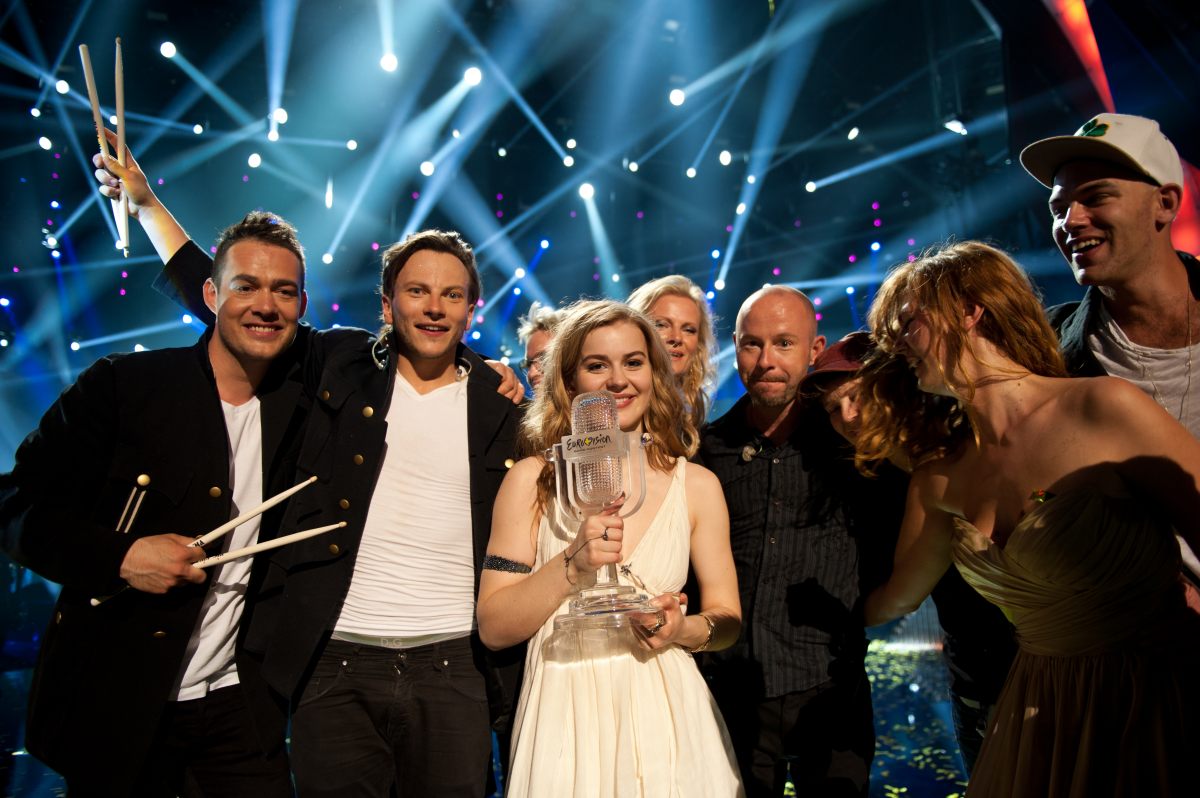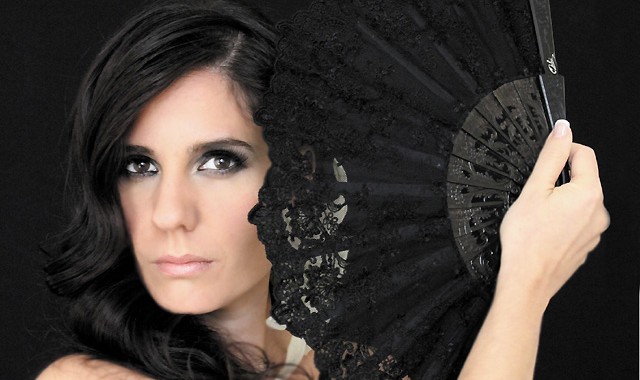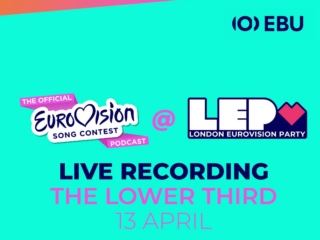Following the grand final of Eurovision 2013, I sat down to run the numbers expecting them to validate what I had found in previous years – that the running order had no impact on the final results. But when I graphed the numbers I found that draw position has a gigantic impact.
In all of the below graphs, a horizontal trend line would indicate the draw having no impact. A line from upper left to lower right shows that latter is advantageous. And boy does it show advantage.
Here’s the vote vs. draw for the final vote.

Drop Ireland and you’ve got a clear grouping that unambiguously shows the impact of the draw.
Diving into it, I ranked the draw vs jury vote. The EBU is not clear what the number for the split vote means, but clearly lower is better. So here we have the experts, the people who should not be impacted by the draw.

The impact is less, but it still clearly exists. Even for the experts, at the completion of the show, the most recently watched acts had an advantage. One of about 3 points where the final scores were in the range of 6 – 20 points. 3 points in a range of 14 is about 20% (for first vs. last place in the draw). If Aliona was say 20th instead of 3rd, she likely would have placed 2nd in the jury vote.
Now let’s look at the televote.

For the televote the draw has a gigantic impact. Malta & Russia were the only acts able to make enough of an impression early in the show to break the curse of an early draw. The vote score range is 20 (4 – 24) and the draw advantage is 10. That’s 50% of the vote range.
Draw is not everything (see Malta, Russia, Georgia, & Ireland). But it matters a lot. Azerbaijan may or may not have bought votes. But they definitely gained significant votes by their draw number of 20. If Russia and Azerbaijan had switched running order, they well could have switched their final place in the contest too.
What Does This Mean?
This year for the first time EBU set the draw order for each act. And by doing so they appear to have increased the impact of the draw order. Regardless of the intention of the EBU, regardless of the how they made their decision in the order, the end result is that their decision heavily influenced the final results.
In fairness to the acts, to the participating countries, to the viewers who watch – the EBU needs to return to a random drawing for the order. The EBU’s calculated ordering has made draw order a gigantic influence on the final result. Previously the order had minimal to no impact. First do no harm – go back to what worked better.
Second, if the order does matter, it is much better for that advantage to be random than to be selected by the EBU. If people see the order confering great advantage, they will accept a random ordering. They will not accept a small number of people selecting who will gain the advantage.
It was a reasonable thing to try. It’s now time to evaluate and reset back to what worked better.
David T is a Colorado-based contributor to wiwibloggs.com. You can keep up-to-date on the latest Eurovision news and gossip by following the team on Twitter @wiwibloggs and by liking our Facebook page.
Photo: Eurovision.tv (EBU)










As this article misses the mark on several accounts, I can’t help but respond. First of all, I would like to point to this excellent article that was posted a while back on ESCInsight: http://www.escinsight.com/2013/01/15/how-much-influence-does-the-running-order-really-have/ In summary it says that scientific research shows that running order indeed has an impact on the outcome. It can make a difference in points of up to 5%. That’s a relatively small percentage, but it can make a difference in a close contest. For example, if Italy and Malta would have switched places in the running order they also might have traded places on… Read more »
Now the analysis is mixing up to things and jumps too quickly to conclusions. Which might not be correct. If you want to make the analysis more fair you have to split the final into two and try to draw that average line from the entries 1-13 and do the same for the entries 14-26. If you do this the first half will have a more steep slope provng your conclusion a little. But the second part of the final, I guess the line will be almost horizontal…. You draw a line from 1 – 26, but the decisions are… Read more »
The longer I calculate with the results the more I only get convinced the new voting system (1-26 ranking instead of 1-10) and the decision not to draw the starting posititions but only in which part of the (semi)final. Why? because calcutations only proof the expert jury is more objective than televote and rules out the extremities because of 1. Neighbourvoting (See Denmaerks points to Iceland, Expert Jury placed Iceland 22nd and Televote must have put Iceland firmly in their top 5 as in the combined jury resulted in a 10th place and therefor 1 point for Eythur. There are… Read more »
1. The expert jury vote line is more horizontal than televote line, therefore this one is more ‘honest’. 2. One has to admit the favourites beginning of May almost all draw the second part of the show. What if you place the final ranking of the pre-eurovision chart in the same diagram? If the thesis of the writer is right, at least that line should be less diagonal than the reality. 3. Did you do the same excersice with the semi’s? Maybe SVT and EBU took into notice the outcome of these two semi’s to place the better scoring songs… Read more »
Personally, I see no problem with the producers choosing the running order. After all Eurovision is first and foremost an entertainment show. As a result of the producers taking charge of the running order this year we had one of the most entertaining shows in years. I think the question of fairness is irrelevant. If a song is strong it deserves to get a good place in the running order, why should a weaker entry be entitled to a better placing at its expense? I’d even say that Eurovision is a bit behind the times in this whole area. Just… Read more »
I feel San Marino would have done better if it had been in a later position. I don’t think any one single person or group should influence the starting order otherwise we can’t say it was impartial. I think it is a very good idea that all songs are ranked to avoid some of the freak results also it means that EVERY vote counts. Many people don’t vote for their favourite songs because they know that the country struggles (e.g. San Marino, Andorra etc) and then vote for a country instead that they know will have a chance. If every… Read more »
Well, I mean, I don’t see what’s wrong with saying that the concentration of pre-contest favorites near the end was a factor, be this jury or televote. I don’t think it’s the only reason, however. And I do also agree with you in saying that the jury tends to slightly favor entries near the end. I’ve noticed this myself in previous years. Alternatively, I guess one could claim that the small slope you see in the jury vote is -entirely- due to the favorites being near the end, and has nothing to do with the running order. However, in that… Read more »
I have one question for those that say to advantage to the later entries was because the best entries were all at the end – then why the very different slope of the average between jury and tele votes?
Yeah, I don’t support the elimination of the jury either, but I do think each jury should be limited to only choosing its top 10 countries (instead of ranking all the countries from first to last), like it was from 2009 to 2012. There was nothing wrong with that scoring system, yet the EBU insisted upon changing it.
I agree with Alex, the Eurovision should go back to random running order, I think it will be so much fair. But I think we can’t just eliminate the jury votes in the overall results because the jury votes make all countries more aware to the quality of the songs that they will send to the competition. In my opinion, EBU should evaluate the new ranking system, I think this is one of the reason why there are so many songs that have 20 points or less this year. Although this may not be the primary reason.
It was pretty clear this time that we’re back to a situation like 2006 where almost nobody does well from the first ten spots. Which is not good. The one part you missed in this analysis is that there WAS a draw: first half or second half! But almost all of the favorites drew second half, which is a large part of the reason the results were the way they were, so in a sense I agree with Benny. However, it was pretty obvious that SVT arranged the running order so that none of the pre-contest favorites in the first… Read more »
Oh and don’t get me wrong: It is of course possible that the songs at the end finished even better thean they would have if they were put at the beginning. But these data are not able to proof that at all.
Sorry, but your conclusion is just wrong. It’s a trivial finding that the songs at the end of the running order finished better. Why? Because they were put at the end of the running order BECAUSE they we’re favourites. So the explanation is the other way round: Songs were expected to do well, so they were placed at the end of the running order and they did not do well becuase they were put at the end.
they should divide the songs by genre, put them in that respective pot, and draw one by one! for example, ballads, pop, rock (not the best of examples, but you get the point), have 3 pots for each of them! assign numbers 1-2-3 to each just to draw which is first! lets say pop -1, ballads- 2, rock- 3! that means a pop song will open the contest, followed by a ballad and a rock after it, then again pop-ballad-rock and so on! extract songs from each pot in this order 1-2-3 1-2-3 1-2-3 until you have no more songs…and… Read more »
I think San Marino was killed in semi 2 because of the running order. Also being placed after Latvia was awkward. It wasn’t a smooth transition.